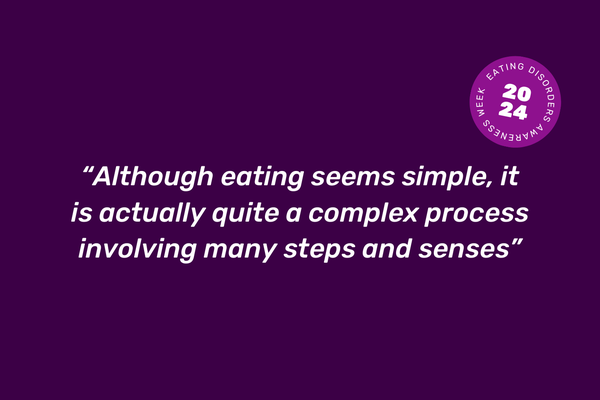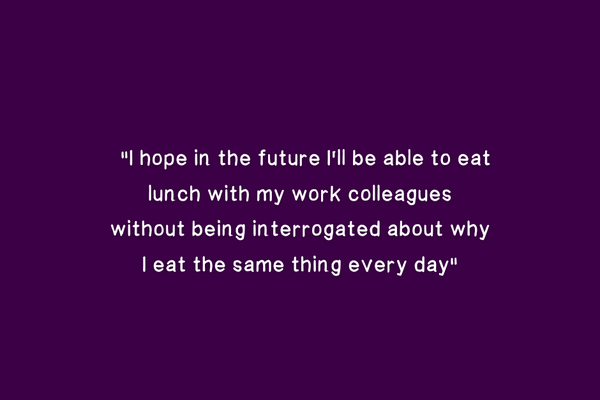We know Avoidant/Restrictive Food Intake Disorder (ARFID) doesn’t always get the airtime it deserves… and it’s time to change that.
We asked people affected by ARFID – either by experiencing it themselves, or through caring for a loved one - what they would like others to know about it. Some clear themes emerged, around the common perceptions, misconceptions and lack of awareness that often sadly accompanies this condition.
Let’s get the conversation started…
Those with experience of ARFID
It's not just 'picky eating'. It's a genuine medical condition that needs to be recognised as such."
"What they said…
- "It's not easy for me to try new foods, so please don't pressure me to. Please don't draw attention to my eating habits; I know they are unusual and it makes me self-conscious.”
- “I'd like people who are interested in ARFID or work in healthcare to know that it's an eating disorder that can be just as serious as any of the others. That it requires different treatment to eating disorders like anorexia and bulimia, but it's still just as deserving of treatment. And it's not as simple as just forcing yourself to eat.”
- “We are not doing it for attention. We don't choose this. The anxiety we feel when confronted with food is all-consuming”
- “For those with ARFID, I hope you know that you are never alone, there will always be someone out there who understands, never be afraid to reach out as help is always available. You are more than your eating disorder, never let it define you.”
- “It can slowly get better. People judge you less when you grow up, and slowly you might start trying new things over time. I have got a better diet than I did as a child, and I can even try new foods easier.”
- “Recovery is possible - it may take a long time and the road is very frustrating, especially because many doctors don’t know much about ARFID, but you can do it. Look for small ways to help yourself and they’ll all add up to a happier and healthier picture.”
What we heard…
There’s a shared frustration from many people with ARFID about a lack of understanding and compassion. ARFID impacts relationships with food and oneself significantly. It's not just about the act of eating; it can involve anxiety, irrational thoughts, and complex emotional responses to food.
We know ARFID is not generally well-known, and there's a call for increased awareness and education about the disorder, both within the general public and the medical community. We all can – and should – do better.
Carers of someone with ARFID
"Don’t back down if you believe your [loved one] needs more support"
What they said…
- “I would like more people to realise the difference between fussy eating and ARFID and know that people with ARFID don’t have a choice… they don’t choose not to eat, they physically can’t.”
- “[I want people with ARFID] to know that they’re not alone and it’s ok & natural to feel worried and stressed out- but don’t allow those feelings to consume you. Seek help and support from medical professionals and peer groups. Don’t back down if you believe your [loved one] needs more support - remember you’re their advocate and nobody will fight harder for them than you.”
- “How the patient feels about food and relates to food is valid, important and they need unconditional support and understanding in order to stay healthy.”
- “It's not fussy eating! Don't pressure people into eating something they can't physically eat. All food is good food.”
- “It's not a choice, it's very different from picky or fussy eating, ignore 'healthy' foods education, go with your gut and let the person eat the foods they want... restricting 'safe' foods will lead to losing them . Remove all food and drink demands and all 'fuss' and traditional eating conventions. Fed is best.”
- “[I want others to know] that this condition exists (even if it still not well known, even amongst medical professionals and help is a postcode lottery). Keep pushing for help...”
What we heard…
ARFID is not a voluntary behaviour. It’s not just being ‘picky’: ARFID is a psychological disorder – we know how important it is to remember the person with ARFID doesn't want to have these feelings surrounding food.
So, what can carers, friends, family, professionals and anyone else caring for someone with ARFID do to help? Here are some top tips:
- Understanding and patience
- Acknowledge the complexity of ARFID and the need for understanding, patience, and validation of the person's feelings and emotions.
- Advocacy and Education
- Advocate for their loved ones, educate themselves, and raise awareness about ARFID in various settings, including schools and healthcare systems.
- Seek Support
- Encourage individuals to reach out for support, connect with others who have similar experiences, and seek professional help.
- Remember it’s not Fussy Eating
- Distinguish ARFID from fussy eating and urging against pressuring individuals to eat foods they're not comfortable with.
- No Blame
- Stress that ARFID is not the fault of the individual or the caregiver and dispelling guilt associated with the disorder.
- Focus on Wellbeing
- Reduce pressure and focus on the wellbeing of the individual rather than making lots of suggestions or trying to stick to conventional mealtime practices etc.
Remember, despite the challenges there is hope.
Anyone with disordered eating has the potential to improve their relationship with food over time, especially when they - and the people around them - have the right tools for support. Small changes and successes shouldn’t be overlooked; It is important to acknowledge and celebrate every victory, however minor, on your journey with ARFID.
Help us to keep amplifying ARFID...
Will you donate and help us to keep the spotlight shining on ARFID?
“Eating is actually quite a complex process” - dietitians Sarah Fuller and Clare Ellison on ARFID vs 'picky eating'
19 February 2024Advanced eating disorder dietitians Sarah Fuller and Clare Ellison discuss the difference between ARFID and 'picky eating'.
Finding ARFID - Frankie's story
1 February 2024Our supporter Frankie shares their experience of discovering they have ARFID, and how far they've come in their recovery
"ARFID and me" - Chloe's story
26 September 2023Our supporter Chloe shares her experience of living with ARFID, and her hopes for better understanding of the eating disorder


